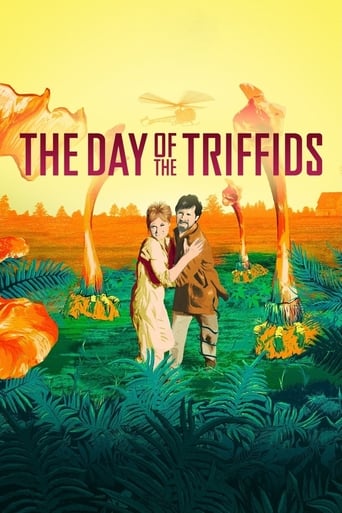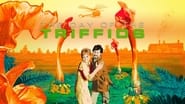l_rawjalaurence
Stylistically speaking, Ken Hannam's production of the classic SF text is very much of its time, with studio-bound sequences alternating with film inserts. The triffids themselves are ingeniously made and cleverly photographed, with the emphasis on their stinging centers and their lengthy stalks. With the accompaniment of creepy music (by Christopher Gunning), they help to create an ambiance that is truly frightening, a dystopian world whose citizens are unable to see, either physically or emotionally.As Bill, John Duttine is both angst-ridden yet determined to ensure that the world should be rid of these threatening plants. His face remains set in an expression of grim determination, contrasting with that of Emma Relph's Jo. There are other actors in the cast, but director Hannam deliberately focuses on the protagonists, thereby emphasizing the importance of Bill's task; as one of the few people still possessed with sight, he has to work mostly independently relying on a combination of native cunning and animal intelligence to succeed in his task.The half-hour episode format works splendidly, helping to provide viewers with a series of climaxes that sustains their attention. If nothing else, DAY OF THE TRIFFIDS proves the old adage that directors and production designers need minimal props in order to create suspense and sustain our attention. If the script is good, and the filming technique cleverly accomplished, our attention can be readily maintained.
nwestwood1
When I was a child in 1984 I think I saw the first rerun of this adaptation and I was terrified. When I brought the DVD a few years ago my perspective changed dramatically. All it is are a bunch of BBC darlings not acting very well and running away from Garden centre props who sound like Skippy The Kangaroo. I also find it amusing that it was filmed mainly in trendy parts of North London. Hampstead, Belsize Park, Primrose Hill and Camden Lock. Cleary the majority of actors and producers lived round that neck of the woods. Hey it' s good budget reductions. If you're from that part of London you will know what I mean! But hey 80s nostalgia is 90% of the time a mistake when it is rewatched in the noughties.
bob the moo
When an asteroid shower passes over the earth, most of the world stops and watches the "once in a lifetime" spectacle. However the vast majority of the world find themselves blinded. This leaves the world at the mercy of the Triffids – a strange species of plant that can move and attack humans, but whose value as an oil resource has seen them farmed and controlled around the world. In a London hospital, Bill Masen is confined to his hospital bed with his eyes bandaged up after a Triffid sting at work. The day after the shower, Bill wakes to find everything quiet with seemingly nobody around to take the bandages off. He stumbles out into the day to find the population blind and, with society quickly crumbling, Triffids seem like just one of the problems to contend with.I quite liked the film version for what it was but it was quite different from the book. This BBC mini-series though, is much more faithful to the source material and produces three hours of television that are more about the people than the plants of the title. If you consider the six episodes, the Triffids are not present throughout and sometimes they are no more than yet another thing in the background. The main thrust is actually about the breakdown of society, the choices the seeing survivors have to make at the early stages and the later stages. As such it is a very British piece as of course there is the polite indecisions and stiff upper lips that see survival accompanied by a certain amount of shame and frustration.Hannam's direction is good as he works well with the sets and effects he has available to him. He has a good script to work with that puts food for thought onto the table consistently, while he also maintains a fairly constant sense of fear in relation to the lack of everything we would expect. In this regard the early episodes were the stronger. Of course the effects are limited but the Triffids themselves are actually pretty good and, if walking, man-eating plants did exist then I imagine they may look like this. The sets are quite cheap and have dated as badly as the clothes etc but this is not really a problem since the material is what is interesting, rather than the effects. The cast mostly work well, with Duttine solid in the lead with Relph doing OK work alongside him and Colbourne a strong presence with a character that asks a lot of moral questions of the viewer.Overall then, better and more faithful to the book than the film version. It looks dated and of course the effects are not brilliant but it is the complexity of a crumbling society and the choices to be made that keep it interesting more than the action of Triffid attacks.
Unicorn-9
I had vivid memories of watching this show as a teenager when it was first shown on TV, and recently bought the DVD. It's not badly done, but at the same time I found it far less effective today than I did then. Surprisingly, the triffid effects didn't look too bad. OK, they're obviously fake plants, but they're about as convincing as could be expected on a BBC budget.I think the main problem is that they tried to cram too much into a relatively short series, so the character development isn't terribly convincing. As some others have pointed out, a number of scenes are basically pure exposition with characters expounding their beliefs without much dramatic impact, characters meet and fall in love in a few minutes, and the whole 'should we help the blind or not?' issue is really skimmed over with people making up their minds very quickly: I know it would make rational sense to let most of the blind die rather than try to keep them alive, but I doubt that most people would write them off as quickly as the characters here do. Another issue watching it in the 21st century is that there are a few very 1970s haircuts that rather give away the age of the show :).So it's worth a look, and it's a far better adaption of the book than the film from the 1960s, but there's still room for a better one!



